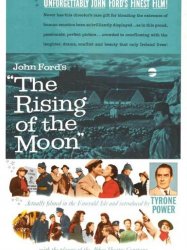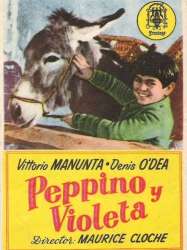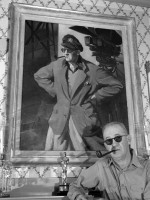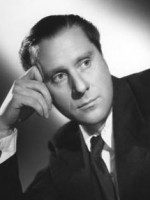Denis O'Dea is a Actor Irlandais born on 26 april 1905 at Dublin (Irlande)

Denis O'Dea (April 26, 1905 – November 5, 1978) was an Irish stage and film actor.
He was born in Dublin. When very young he and his mother Kathleen (from County Kerry) moved in with her sister, who kept a boarding house at 54 South Richmond Street. He worked in insurance until taking up acting. O'Dea was a leading member of Dublin's Abbey Theatre, where his work led to a number of notable film roles, including two mid-1930s John Ford films, The Informer (1935 film) and The Plough and the Stars (1936), and the part of the police inspector in pursuit of IRA man James Mason in Carol Reed's Odd Man Out (1947).
Other films in which he appeared include: The Mark of Cain (1947), The Fallen Idol (1948, again for Reed, and again as a police inspector), Alfred Hitchcock's Under Capricorn (1949), The Bad Lord Byron (1949), Landfall (1949), Disney's Treasure Island (1950), Marry Me! (1950), Captain Horatio Hornblower R.N. (1951), The Long Dark Hall (1951), Mogambo (1953; another John Ford film), Niagara (1953), Never Take No For An Answer (1953), The Rising of the Moon (1957), Captain Lightfoot (1957), Darby O'Gill and the Little People (1959) and Esther and the King (1960).
Au cours des années 1930, il joue également à Broadway (New York), principalement dans des pièces produites par l'Abbey Theatre, entre autres aux côtés des frères Shields (ex. : The Plough and the Stars de son compatriote Seán O'Casey en 1934). Ultérieurement, il ne revient à Broadway que pour une pièce, représentée en 1955-1956.
Au cinéma, en raison de sa carrière théâtrale, Denis O'Dea contribue à seulement vingt-quatre films (britanniques, irlandais ou américains, plus quelques co-productions), le premier — irlandais — sorti en 1935. Ses trois films suivants sont américains, dont deux réalisations de John Ford, Le Mouchard (1935, avec Victor McLaglen et Margot Grahame) et Révolte à Dublin (1936, avec Barbara Stanwyck, Preston Foster et les frères Shields) ; ce dernier, titré originalement The Plough and the Stars, est l'adaptation de la pièce éponyme pré-citée.
Son cinquième film, britannique, est Huit heures de sursis de Carol Reed (avec James Mason, Robert Newton et Cyril Cusack), sorti en 1947. Parmi ses films suivants, citons Les Amants du Capricorne d'Alfred Hitchcock (1949, avec Ingrid Bergman et Joseph Cotten), Capitaine sans peur de Raoul Walsh (1951, avec Gregory Peck et Virginia Mayo), Mogambo de John Ford (1953, avec Clark Gable, Ava Gardner et Grace Kelly), ou encore Niagara d'Henry Hathaway (1953, avec Marilyn Monroe, Joseph Cotten et Jean Peters). Son dernier film est la co-production américano-italienne Esther et le Roi de Raoul Walsh et Mario Bava (avec Joan Collins et Richard Egan), sortie en 1960.
Pour la télévision, Denis O'Dea collabore à un téléfilm britannique (avec sa future épouse) d'origine théâtrale et diffusé en 1951, puis à trois séries, dont Le Monde merveilleux de Disney — l'épisode où il apparaît, diffusé en 1959, est en fait tiré de son avant-dernier film, Darby O'Gill et les Farfadets de Robert Stevenson (1959, avec Albert Sharpe, Janet Munro et Sean Connery), produit par les studios Disney —.
Source : Wikidata
Denis O'Dea

- Infos
- Photos
- Best films
- Family
- Characters
- Awards
Nationality Irlande
Birth 26 april 1905 at Dublin (Irlande)
Death 5 november 1978 (at 73 years) at Dublin (Irlande)
Birth 26 april 1905 at Dublin (Irlande)
Death 5 november 1978 (at 73 years) at Dublin (Irlande)
He was born in Dublin. When very young he and his mother Kathleen (from County Kerry) moved in with her sister, who kept a boarding house at 54 South Richmond Street. He worked in insurance until taking up acting. O'Dea was a leading member of Dublin's Abbey Theatre, where his work led to a number of notable film roles, including two mid-1930s John Ford films, The Informer (1935 film) and The Plough and the Stars (1936), and the part of the police inspector in pursuit of IRA man James Mason in Carol Reed's Odd Man Out (1947).
Other films in which he appeared include: The Mark of Cain (1947), The Fallen Idol (1948, again for Reed, and again as a police inspector), Alfred Hitchcock's Under Capricorn (1949), The Bad Lord Byron (1949), Landfall (1949), Disney's Treasure Island (1950), Marry Me! (1950), Captain Horatio Hornblower R.N. (1951), The Long Dark Hall (1951), Mogambo (1953; another John Ford film), Niagara (1953), Never Take No For An Answer (1953), The Rising of the Moon (1957), Captain Lightfoot (1957), Darby O'Gill and the Little People (1959) and Esther and the King (1960).
Biography
Denis O'Dea débute au théâtre dans sa ville natale à la fin des années 1920, comme membre (très actif) de la troupe de l'Abbey Theatre, où il a notamment comme partenaires Arthur Shields, Barry Fitzgerald (né William Shields, frère du précédent), Cyril Cusack, Maureen O'Sullivan et Siobhán McKenna (cette dernière devient son épouse en 1956, puis sa veuve à son décès en 1978). Mentionnons The King of the Great Clock Tower de William Butler Yeats en 1934, avec la danseuse et chorégraphe Ninette de Valois.Au cours des années 1930, il joue également à Broadway (New York), principalement dans des pièces produites par l'Abbey Theatre, entre autres aux côtés des frères Shields (ex. : The Plough and the Stars de son compatriote Seán O'Casey en 1934). Ultérieurement, il ne revient à Broadway que pour une pièce, représentée en 1955-1956.
Au cinéma, en raison de sa carrière théâtrale, Denis O'Dea contribue à seulement vingt-quatre films (britanniques, irlandais ou américains, plus quelques co-productions), le premier — irlandais — sorti en 1935. Ses trois films suivants sont américains, dont deux réalisations de John Ford, Le Mouchard (1935, avec Victor McLaglen et Margot Grahame) et Révolte à Dublin (1936, avec Barbara Stanwyck, Preston Foster et les frères Shields) ; ce dernier, titré originalement The Plough and the Stars, est l'adaptation de la pièce éponyme pré-citée.
Son cinquième film, britannique, est Huit heures de sursis de Carol Reed (avec James Mason, Robert Newton et Cyril Cusack), sorti en 1947. Parmi ses films suivants, citons Les Amants du Capricorne d'Alfred Hitchcock (1949, avec Ingrid Bergman et Joseph Cotten), Capitaine sans peur de Raoul Walsh (1951, avec Gregory Peck et Virginia Mayo), Mogambo de John Ford (1953, avec Clark Gable, Ava Gardner et Grace Kelly), ou encore Niagara d'Henry Hathaway (1953, avec Marilyn Monroe, Joseph Cotten et Jean Peters). Son dernier film est la co-production américano-italienne Esther et le Roi de Raoul Walsh et Mario Bava (avec Joan Collins et Richard Egan), sortie en 1960.
Pour la télévision, Denis O'Dea collabore à un téléfilm britannique (avec sa future épouse) d'origine théâtrale et diffusé en 1951, puis à trois séries, dont Le Monde merveilleux de Disney — l'épisode où il apparaît, diffusé en 1959, est en fait tiré de son avant-dernier film, Darby O'Gill et les Farfadets de Robert Stevenson (1959, avec Albert Sharpe, Janet Munro et Sean Connery), produit par les studios Disney —.
Usually with
Filmography of Denis O'Dea (25 films)
Actor

Esther and the King (1960)
, 1h49Directed by Mario Bava, Raoul Walsh
Origin Italie
Genres Drama, Peplum
Themes Films about religion, Films based on the Bible, Films about Jews and Judaism, Children's films
Actors Joan Collins, Richard Egan, Denis O'Dea, Sergio Fantoni, Renato Baldini, Gabriele Tinti
Roles Mordecai
Rating55%





The film is set in Persia in the 5th century BC. After the King’s wife is murdered, Esther (a Jewish woman) comes to the attention of the recently widowed King Ahasuerus. The king has been trying to stifle and defeat the campaign of hatred against the Jews by his evil minister Haman (Sergio Fantoni). Before the King can pair off with Esther and defeat the villainous Haman, there are several intervening adventures and an additional, attractive woman who competes for attention.

Cradle of Genius (1960)
, 25minutesGenres Documentary
Actors Maureen Delany, Barry Fitzgerald, Siobhán McKenna, Cyril Cusack, Denis O'Dea, Ria Mooney
Roles Self
Rating61%





 , 1h33
, 1h33Directed by Robert Stevenson
Origin USA
Genres Science fiction, Fantasy, Adventure, Romance
Themes Children's films
Actors Albert Sharpe, Janet Munro, Sean Connery, Estelle Winwood, Kieron Moore, Denis O'Dea
Roles Father Murphy
Rating70%





Darby O'Gill (Albert Sharpe) is the aging caretaker of Lord Fitzpatrick's (Walter Fitzgerald) estate in the small Irish town of Rathcullen, where he lives in the gatehouse with his lovely, almost grown, daughter Katie (Janet Munro). Darby spends most of his time in the town pub, regaling his friends with tales of his attempts to catch the leprechauns, in particular, their king, Brian Connors (Jimmy O'Dea).

The Rising of the Moon (1957)
, 1h21Directed by John Ford
Origin Irlande
Genres Drama, Comedy
Themes Transport films, Rail transport films
Actors Cyril Cusack, Noel Purcell, Denis O'Dea, Tyrone Power, John Cowley, Jack MacGowran
Roles Police Sergeant Tom O'Hara (segment '1921')
Rating65%





Police Inspector Dillon (Cyril Cusack) reluctantly sets out to see an old friend, Dan O'Flaherty (Noel Purcell). Along the way, he encounters Mickey J. (Jack MacGowran), a poitín maker who, fortunately for him, is not Dillon's target today. The inspector has the unfortunate duty of serving a warrant on O'Flaherty for striking Phelim O'Feeney (John Cowley) on the head. O'Flaherty refuses to pay the fine, as he feels he has done nothing wrong, nor will he allow O'Feeney to pay it for him. Instead, he heads off to prison.

The Story of Esther Costello (1957)
, 1h43Directed by David Miller
Origin United-kingdom
Genres Drama
Themes Films about sexuality, Rape in fiction
Actors Joan Crawford, Rossano Brazzi, Heather Sears, Lee Patterson, June Clyde, Bessie Love
Roles Father Devlin
Rating63%





With her marriage to womaniser Carlo Landi (Rossano Brazzi) in ashes, wealthy and childless Margaret Landi (Joan Crawford) finds an emotional outlet in patronizing a 15-year-old deaf, dumb, and blind Irish girl named Esther Costello (Heather Sears). Esther's disabilities are the result of a childhood trauma and are psychosomatic rather than physical. As Costello makes progress with Braille and sign language, she is seen as an example of triumph over adversity. Carlo gets wind of Margaret's new life and re-enters the scene. He views Esther as a source of cheap financial gain and arranges a series of exploitative tours for her under a mercenary manager Frank Wenzel (Ron Randell). One day when Margaret is absent from the Landi apartment, Carlo seduces and rapes the now 16-year-old Esther. The shock restores the girl's sight and hearing. When Margaret learns of her husband's business duplicities and the rape, she consigns Esther to the care of a priest and a young reporter who loves her (Lee Patterson). Margaret then kills Carlo and herself.

Captain Lightfoot (1955)
, 1h32Directed by Douglas Sirk
Origin USA
Genres Drama, Adventure, Historical, Romance
Actors Rock Hudson, Barbara Rush, Jeff Morrow, Finlay Currie, Kathleen Ryan, Denis O'Dea
Roles Regis Donnell
Rating61%





En 1815, Michael Martin est membre d'un groupe révolutionnaire irlandais. Il est obligé de passer à la clandestinité et devient le second d'un célèbre capitaine rebelle

Mogambo (1953)
, 1h55Directed by John Ford
Origin USA
Genres Drama, Adventure, Romance
Themes Films set in Africa, Films based on plays
Actors Clark Gable, Ava Gardner, Grace Kelly, Donald Sinden, Laurence Naismith, Philip Stainton
Roles Father Josef
Rating65%





Eloise "Honey Bear" Kelly (Ava Gardner) arrives at a remote African outpost, looking for a rich maharajah acquaintance, only to find he has cancelled his trip owing to unrest in his realm. While waiting for the next river boat out, she spars with hardworking big game hunter Victor Marswell (Clark Gable), who (initially) pegs her as a certain disreputable type. When the river boat returns, it brings Donald Nordley (Donald Sinden) and his wife Linda (Grace Kelly). The Nordleys wish to go on safari to film gorillas. Marswell declines to guide them. Honey Bear rejoins the group after the steamer runs aground. Tensions run high between the two women when Linda is also attracted to Marswell.

Niagara (1953)
, 1h32Directed by Henry Hathaway, Gerd Oswald
Origin USA
Genres Drama, Thriller, Noir, Crime
Themes Children's films
Actors Marilyn Monroe, Joseph Cotten, Jean Peters, Max Showalter, Don Wilson (kickboxeur), Lurene Tuttle
Roles Inspector Starkey
Rating69%





Ray and Polly Cutler (Showalter and Peters) on a delayed honeymoon at Niagara Falls, find their reserved cabin occupied by George and Rose Loomis (Cotten and Monroe). Rose tells them that George is asleep at last, and has recently been discharged from an Army mental hospital. The Cutlers politely accept another, less desirable cabin, and so the two couples become acquainted.

Sea Devils (1953)
, 1h31Directed by Raoul Walsh
Origin United-kingdom
Genres Drama, Action, Adventure
Themes Spy films, Seafaring films, Transport films, Political films, Histoire de France, Napoleonic Wars films
Actors Rock Hudson, Yvonne De Carlo, Bryan Forbes, Maxwell Reed, Gérard Oury, Denis O'Dea
Roles Lethierry
Rating56%





The year is 1800, and Britain and France have been at war since 1798, in what later was to be known as the War of the Second Coalition. Gilliatt, a fisherman-turned-smuggler on Guernsey, agrees to transport a beautiful woman, Drouchette, to the French coast. She tells him she hopes to rescue her brother from a French prison. Gilliatt finds himself falling in love and so feels betrayed when he later learns that Drouchette is a countess helping Napoleon plan an invasion of Britain. In reality, however, Drouchette is a British agent working to thwart this invasion. When Gilliatt learns this, he returns to France to rescue her, just as her true purpose has been discovered by the French.

Peppino e Violetta (1952)
Directed by Maurice Cloche
Origin Italie
Themes Films about magic and magicians
Actors Nerio Bernardi, Guido Celano, Arnoldo Foà, Clelia Matania, Gorella Gori, Enzo Fiermonte
Roles Père Damico
Rating65%





 , 1h57
, 1h57Directed by Raoul Walsh
Origin USA
Genres Drama, War, Action, Adventure, Historical
Themes Seafaring films, Transport films, Pirate films, Political films, Histoire de France, Napoleonic Wars films, French Revolution films
Actors Gregory Peck, Virginia Mayo, Robert Beatty, Terence Morgan, James Robertson Justice, Moultrie Kelsall
Roles RAdm. Sir Rodney Leighton
Rating72%





In 1807, during the Napoleonic Wars, British Royal Navy Captain Horatio Hornblower (Gregory Peck) commands the 38-gun frigate HMS Lydia on a lengthy secret mission to Central America. He is to provide arms and support to a megalomaniac named Don Julian Alvarado, who is calling himself "El Supremo" or "The Almighty" (Alec Mango), in his rebellion against Spain, an ally of Britain's enemy France. As Hornblower observes to First Lieutenant Bush (Robert Beatty), "War breeds strange allies."

The Long Dark Hall (1951)
, 1h26Directed by Reginald Ernest Beck, Anthony Bushell
Origin United-kingdom
Genres Drama, Crime
Actors Rex Harrison, Lilli Palmer, Ronald Simpson, Raymond Huntley, William Squire, Ballard Berkeley
Roles Sir Charles Morton
Rating61%






Never Take No for an Answer (1951)
, 1h22Directed by Maurice Cloche, Ralph Foster Smart
Origin United-kingdom
Genres Drama
Actors Nerio Bernardi, Denis O'Dea, Clelia Matania, Enzo Fiermonte, Guido Celano
Roles Father Damico
Rating73%





Nine years old war orphan Peppino Arrigo lives in the Italian town of Assisi with his donkey, Violetta. The two are devoted to each other and make a living transporting goods for the locals. One night, Violetta falls seriously ill and Peppino runs for the vet, who, on examining her, tells Peppino that he can do nothing to save her and that she may live for only another week or two. Very worried, Peppino takes Violetta to the church of St Francis, hoping that the priests will let him take her down into the crypt to be blessed and cured at the shrine of St Francis, but the priests will not allow it. Only the Holy Father himself could give such permission. So Peppino decides to take the matter to the very top and, leaving Violetta in the loving care of a friend, he sets off alone on an eighty miles journey to see the Pope in Rome and get that permission. But, when he finally reaches Rome, he finds to his dismay that getting inside the Vatican to see the Pope will be no mean feat. However, Peppino will not take no for an answer.

Treasure Island (1950)
, 1h36Directed by Byron Haskin
Origin USA
Genres Adventure
Themes Seafaring films, Transport films, Pirate films, Films about disabilities, Children's films, L'Or
Actors Bobby Driscoll, Robert Newton, Basil Sydney, Finlay Currie, Walter Fitzgerald, Denis O'Dea
Roles Dr. Livesy
Rating68%





In the West Coast of England in 1765, a young boy called Jim Hawkins lives with his mother in a tiny country inn which they run. Captain William Bones, a sickly lodger, gives Hawkins a treasure map after being visited by two pirates, the second of whom gives the captain a note marked with the black spot. That same night Bones is found dead at the inn, and Hawkins shows Squire Trelawney the map. Trelawney recognises the map as belonging to the buccaneer Captain Flint and bankrolls a voyage to discover the pirate's lost treasure. Trelawney hires Captain Smollett and his ship, the Hispaniola, bringing along his friend Dr. Livesey as the ship's doctor and Hawkins as the cabin boy.

The Fallen Idol (1949)
, 1h35Directed by Carol Reed, Guy Hamilton
Origin United-kingdom
Genres Drama, Thriller, Comedy-drama
Actors Ralph Richardson, Bobby Henrey, Jack Hawkins, Michèle Morgan, Denis O'Dea, Sonia Dresdel
Roles Inspector Crowe
Rating75%





The film is told through the naive eyes of a diplomat's young son, Phillipe, who idolises his father's butler, Baines. Baines has invented a heroic persona to keep the boy entertained, and often tells him stories of his exotic and daring adventures in Africa and elsewhere, stories such as putting down a native uprising single-handed, killing a man in self-defense, and so on.
 Connection
Connection



